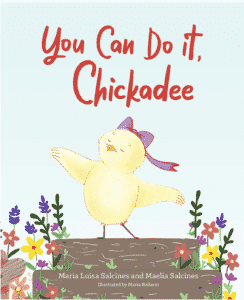
Chickadee, a small, yellow chick who wears a long purple bow, usually loves to play outside with her sisters. But all of a sudden, she doesn’t want to. She didn’t have the energy.
Watching her sister chicks having fun, she asks herself: “Why can’t I?”
She wants to play outside with her sisters, but can’t even muster the energy to get out of bed. Her mom tells her to just “take one step, two step, three step, four.” And before Chickadee leaves out of the door, her mom reminds her to take her depression pills.
Chickadee is the star of Maria Luisa Salcines and Maelia Salcines’ children’s book, “You Can Do It, Chickadee!” which follows a day of an endearing chick’s physical and emotional challenges with depression — and it’s based on their own struggle with the disease.
The mother-daughter duo of McAllen residents co-authored the book with two goals in mind: reassuring those facing depression that they aren’t alone, and teaching parents how to identify signs that their child may be depressed, and how they can tenderly support them through it. Resources and guides for being parents for children with depression are provided in the last few pages of the book.
On Thursday, “You Can Do It, Chickadee!” was recognized as a gold recipient of the Mom’s Choice Awards, a national organization that evaluates products created for children, families and educators.
“We want this book to be a tool parents and educators can use to talk to children about mental health and normalize the topic,” Maria said. “We want them not to feel embarrassed about talking about their true feelings.”
And really, the duo produced a book they wished they read while Maelia faced her own mental health battle.
Her depression crept up in high school, but all the extracurriculars Maelia was a part of — yearbook and cheerleading — kept her busy enough to hide it. However, it was during her first year of college at St. Edward’s University at San Antonio when signs of her disorder really surfaced.
When Maelia visited home after her freshman year, her obvious weight loss alarmed her parents. Maria said it was heartbreaking to see how distressed and sad her daughter was, so she kept her from going back to college to address her depression.
“There’s a saying that goes, ‘You’re only as happy as your saddest child,’” Maria said. “And for me, it was heartbreaking to see my daughter who used to be so happy and bubbly and friendly, to see her in such a sad state.”

Chickadee, like Maelia, struggles with having an appetite because of her depression. She also is insecure about having to take medication for the disease, fearful of what others may think of her.
Through the book, Maelia hopes to normalize mental health problems, especially among children.
According to the Centers for Disease Control and Prevention, nearly 2 million children in the country between 3 and 17 years old are diagnosed with depression. Additionally, three of every four of those children suffer from another mental disorder as well, like anxiety.
Maelia was diagnosed with depression and anxiety after her first year of college after her physician discovered she had a chemical imbalance in her body. Her brain was not producing an adequate amount of hormones that make people feel happy, including serotonin and dopamine.
“Sometimes, depression comes from an event, something sad happened in their life,” Maria explained. “In her case it wasn’t that, it was a chemical change.”
Since her diagnosis, Maelia has been taking medication that assists her mind in releasing those happy chemicals. Though, stumbling across a few bad days will always be inevitable.
“One of the main things that we wanted parents to understand is that sometimes with depression and anxiety, especially in the Latino culture, it’s not recognized,” Maria said. “It’s, ‘Quit being lazy,’ or ‘Get it together, snap out of it, be a man and grow up,’ and we need to change that mindset.
“When you see your child depressed, they’re not faking this. They need help, and so it’s important for parents to validate their child’s feelings.”
It was important for the Salcines’ that parents not only become more empathetic to children facing depression, but also be able to recognize signs of the disease — because when Maelia first started showing symptoms, Maria was unaware of them.
“We didn’t really notice it or pay attention to it,” Maria said. “We didn’t know it, we thought maybe she was just stressed with school and with everything she was doing, but she was very anxious.”
In one page of the children’s book, Chickadee is apologizing to her mom for yelling at her; signs of depression include irritableness and uncontrollable emotions.
Maelia said in the earlier stages of her depression, her grades began to dip and her attention span shortened. She also picked up the habit of biting her nails and oscillated between overeating and undereating.
“We wanted a tool that parents and educators can use to talk to children about mental health and normalize the topic, to not feel embarrassed about talking about their feelings,” Maria said. “We just want to educate families and so that counselors and teachers and parents and caretakers can have something because even though this is a children’s book, we could read it to high schoolers and I think a teenager would be able to understand chickadee, and realize they went through that.”



